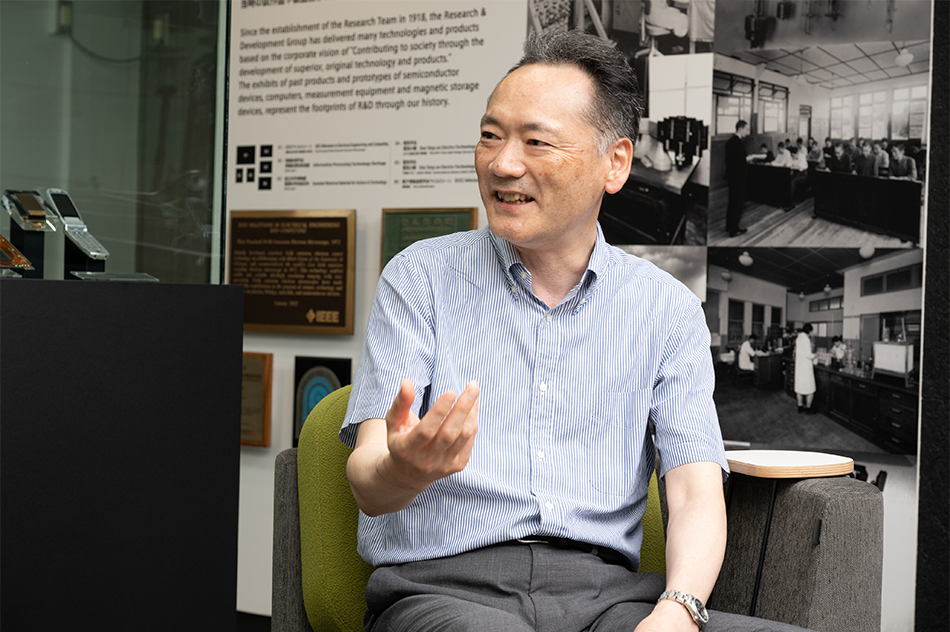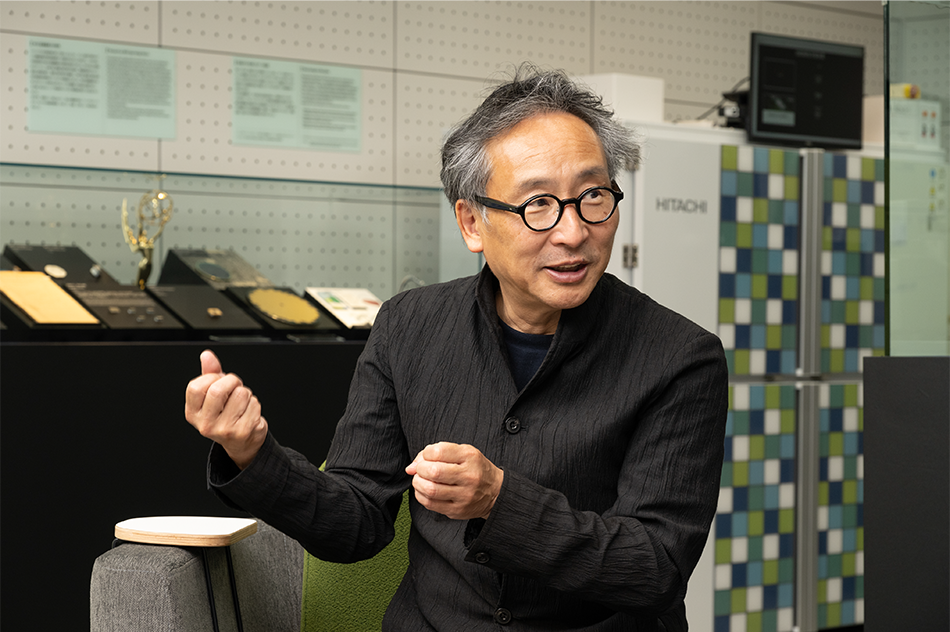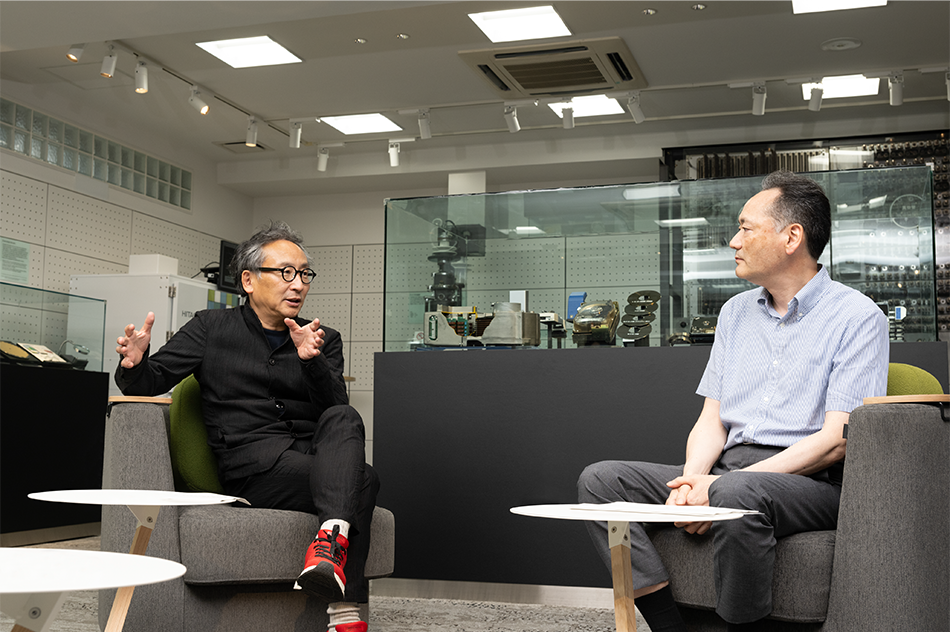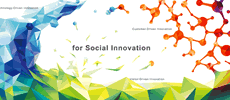DiscussionPotential for Breakthroughs Lies in What We Cannot DoPhilosophizing about Quantum Computers
Highlight
Quantum computers have attracted attention as a new generation of computing. Amid intense global competition on development, Hitachi has drawn on its expertise in semiconductors to focus on silicon quantum computers. This has included accelerating development, which is being undertaken as one of the research projects for “Realization of a fault-tolerant universal quantum computer that will revolutionize economy, industry, and security by 2050,” Goal 6 of the Moonshot Research and Development Program being run by Japan’s Ministry of Education, Culture, Sports, Science and Technology.
Having an order of magnitude greater capacity than conventional computing technologies, it is anticipated that quantum computers will prove their worth in applications such as materials development and simulation. As such, what challenges will accompany this new science and technology as it enters widespread use? In this article, Hiroyuki Mizuno, project manager of the above-mentioned “Large-scale Silicon Quantum Computer” research project invited the philosopher Yasuo Deguchi to provide a philosophical perspective on what needs to be considered in the research and development of quantum computers. Hiroyuki Mizuno is a Distinguished Researcher at the Center for Exploratory Research, and Director of the Hitachi Kyoto University Laboratory, Research & Development Group, Hitachi, Ltd. Yasuo Deguchi is a Professor at the Department of Philosophy and Dean of the Graduate School of Letters, Kyoto University.
![Photographed at quantum computing facility of Central Research Laboratory, Hitachi, Ltd. [Hiroyuki Mizuno (left), Hitachi, Ltd. and Yasuo Deguchi (right), Kyoto University]](/rev/column/content/vol27/image/fig_01.png) Photographed at quantum computing facility of Central Research Laboratory, Hitachi, Ltd. [Hiroyuki Mizuno (left), Hitachi, Ltd. and Yasuo Deguchi (right), Kyoto University]
Photographed at quantum computing facility of Central Research Laboratory, Hitachi, Ltd. [Hiroyuki Mizuno (left), Hitachi, Ltd. and Yasuo Deguchi (right), Kyoto University]
Philosophical Knowledge Essential to Resolving Societal Challenges
MizunoInformation technology has seen an intensification of competition in the development of quantum computers over recent years. While it is these quantum computers that we are here to talk about today, it was from a desire to approach the subject from a somewhat different angle to those of physics and computational science that I chose to invite Professor Yasuo Deguchi of the Graduate School of Letters at Kyoto University.
Professor Deguchi, through your involvement in joint research with Hitachi Kyoto University Laboratory, you have provided us with considerable input from a philosophical perspective. Having obtained numerous insights from the knowledge of people working in the humanities and social sciences, our own science- and technology-focused researchers at Hitachi appreciate the strong collaborative relationship we have established.
I understand that, in the field of philosophy itself, your interests cover a wide range of topics.
DeguchiThat’s right. I am not someone who delves into one particular area to the exclusion of others. Rather, I have developed my own philosophical thinking that, while based on contemporary Western philosophy, also calls on a variety of other knowledge including East Asian philosophy. My recent work has included a reformulation, in contemporary philosophical terms, of the thinking of Dōgen, a Zen Buddhist monk of the Kamakura period.
Prior to that, I spent much of my 30s and 40s working on the philosophy of science where my interest was less on theory than it was on what was happening on the experimental sites. I acquired an interest in experimental knowledge that has yet to be organized and abstracted as theory and the sort of laboratory level know-how that is similar in nature to tacit knowledge, collating such knowledge and subjecting it to philosophical analysis.
A particular focus of this work was on “measurement.” Measurement is fundamental to scientific experimentation and accurate measurement is the basis of engineering, industry, and manufacturing. Given that these measurement techniques are themselves based on the principles of science and engineering, the act of measurement is very much emblematic of “know-how.” While this is something I only found out later, my mother’s family used to manufacture arms in Sakai during the Sengoku period (the time of Japan’s civil war). From the Edo period onward, however, they switched to making spring balance scales. Given that scales are a type of measuring instrument, I thought it an interesting coincidence.
MizunoIs that right? My own grandfather ran a car repair workshop. Perhaps it was the time I spent as a child playing nearby while panel spraying and other body repair work was going on that gave me a love of manufacturing and led to my choosing to study engineering at university. While I was interested in computers to begin with, I found the semiconductor physics classes fascinating and so in the end that was the path I chose to pursue. While I continued to work on semiconductor research after joining Hitachi, I redirected my research to computer science after the semiconductor business ended. Since 2018, I have been affiliated with the Hitachi Kyoto University Laboratory.
From about 2011 when I was engaged in computer science research I began to feel doubts about whether computer technologies on their own could really solve challenges facing society that have their roots in living things, namely human beings. Hitachi Kyoto University Laboratory has been set up as a facility for collaborative research that is predicated on a recognition of this very problem. That is why I believe it is vital that we consider knowledge from the humanities and social sciences that thinks deeply about the human condition, especially the insights that can be offered by academics like yourself who work in the field of philosophy.
DeguchiWhile my origins lie entirely in the humanities, being a graduate of the Division of Philosophy, Faculty of Letters at Kyoto University, it was through the study of topics such as the philosophy of science and logic that I came to realize how comfortable I felt with the scientific way of thinking in the sense of placing theorems one on top of the other to build an intellectual construct. It may be that the way I think has something in common with that of technologists. I have very much enjoyed our joint research work with Hitachi Kyoto University Laboratory, having found areas of mutual understanding with people working there who have different specialties and speak a different language.
Quantum Computers at Forefront of Modern Technology
MizunoIt was around 2011 that we began development work on next-generation computers, including quantum computers. While quantum computers and the like were seen as little more than a dream back then, the mood changed significantly over subsequent years and Hitachi is among those who have launched serious research and development efforts in the field. A research and development project entitled “Large-scale Silicon Quantum Computer” got underway in FY2020 as one of the projects aimed at achieving Goal 6 of the Moonshot Research and Development Program*1.
Quantum computers work by using quantum bits (qubits) in place of the bits that represent the fundamental unit of information in a classical computer. They are able to process information in ways that take advantage of the quantum phenomena of superposition, entanglement, and quantum measurement. While there are many ways of constructing a qubit, the silicon quantum computers that are the focus of Hitachi’s research use electron spin states in a silicon semiconductor for this purpose, an approach that is well suited to up-scaling.
Computers are designed on the basis of a mathematical framework known as the Turing machine. In the case of quantum computers, there exists a corresponding quantum Turing machine. The technology has been described as taking the concept of a Turing machine to its ultimate extreme. There is no way to make computers any more powerful than this without extending mathematics into new areas, beyond even complex numbers for example. To work in a field like this at the very forefront of present-day technology is the ultimate dream for a researcher. By the same token, unfortunately, development is very difficult and making progress is a daily slog.
DeguchiThe imaginary unit i that features in complex numbers was long treated as an anomaly in mathematics. It is difficult to conceptualize, being defined as the number that, when squared, gives −1. Through the work of mathematicians like Euler and Gauss in the 18th and 19th centuries, however, i and the complex numbers were established as a robust and firmly grounded foundation on which was built a variety of different mathematical ideas. This mathematical grounding represented by complex numbers has proven itself useful in many real-world applications and it was likewise essential to the formulation of quantum mechanics. It is interesting also in terms of mathematical history that the quantum computer, an application of quantum mechanics, has popped up like the final boss in a video game, presenting itself as the final challenge in a paradigm dating back to Euler and Gauss that has evolved over more than two centuries.
You can say something similar about the way silicon quantum computers work, in that the ability to control individual electrons likewise represents the ultimate when it comes to electronics. When you think of them as a culmination of the progress made by modern science and technology, quantum computers are extremely fascinating.
- *1
- R&D project "Large-scale Silicon Quantum Computer (Project Manager: Hiroyuki Mizuno) grant No. JPMJMS2065" under the Japan Science and Technology Agency's Moonshot Research and Development Program/Goal 6 "Realization of a fault-tolerant universal quantum computer that will revolutionize economy, industry, and security by 2050. (Program Director: Masahiro Kitagawa)".
Is the Natural World Computable?
 Hiroyuki Mizuno
Hiroyuki Mizuno
Distinguished Researcher, Center for Exploratory Research, and Director, Hitachi Kyoto University Laboratory, Research & Development Group, Hitachi, Ltd.
Joined Hitachi, Ltd. in 1993. Served as a Visiting Scholar at Stanford University, USA from 2002 to 2003. He holds a doctorate in engineering and is a fellow of the IEEE. He is currently engaged in the research and development of silicon quantum computers under the Moonshot Research and Development Program to which he was appointed a project manager in 2020. At Hitachi Kyoto University Laboratory, he is involved in a program entitled, “Exploration of basics and theory based on an understanding of humanity and culture.” This involves working with a range of experts, primarily academics and students at Kyoto University, to investigate “Social Co-Operating Systems,” meaning mechanisms for combining science and the arts in ways that balance social, environmental, and economic value.
MizunoIf quantum computers represent the ultimate in computers, this inevitably beings us to the topic of computation. Given that what we want from computers are solutions to societal challenges, we are confronted with a crucial question. Is human society, and the natural world of which it forms a part, something that can be computed?
DeguchiHow far can calculation go, and what is computation anyway? In philosophy, too, these are big questions. Given that many natural phenomena are continuous analogue processes, numerical computation in a computer works by the linear approximation of these analogue curves. They also perform rounding, adjusting numbers up or down to the nearest whole digit. These differences need to be considered when thinking about computation in philosophical terms. Improving calculation accuracy in search of precision comes at the cost of limiting the choice of techniques that can be used. Where to strike the balance between precision and technique, and what consequences come with approximation, are questions of philosophical interest also.
MizunoTalk of computation raises the issue of how it meshes with information, as exemplified by subjects like quantum information theory and information thermodynamics that have emerged as new lines of inquiry in the field of physics. The information being spoken of here is expressed in terms of its smallest possible unit, binary bits that can only take a value of 0 or 1. For example, given that quantum mechanics is all about modeling quantum behavior and phenomena to better understand them, the field of quantum computers arises out of a fusion of this with quantum information. Another way of putting it is that quantum computing seeks to overcome the limitations of classical information processing by adopting a quantum mechanical treatment of classical information (bits).
Quantum errors are one of the major challenges to the practical realization of quantum computers. In December 2023, however, a research team based primarily at Harvard University successfully executed a large-scale algorithm involving 48 qubits that included an error correction technique(1). The experiment was widely recognized as a major advance given that previous efforts had only ever succeeded in doing this for one or two qubits. The technique used to correct quantum errors is another application of information theory. The quantum computers currently under development can be thought of as having more to do with information than with quantum states.
On the other hand, I also recognize the possibility for a quantum computer that is more concerned with quantum processes, which is to say one that works directly with continuous analogue quantities. While the form that such a computer might take has yet to be defined, I imagine that such an analogue quantum computer, were it to be realized, would be able to simulate natural analogue phenomena directly.
What is Lost When Analogue Is Converted to Digital?
 Yasuo Deguchi
Yasuo Deguchi
Professor, Department of Philosophy and Dean of Graduate School of Letters, Kyoto University
Graduated from the Faculty of Letters at Kyoto University and obtained a doctorate in philosophy from the graduate school at the same institution. Appointed Associate Professor at the university’s Graduate School of Letters in 2004, and to his current position in 2016. His research areas include modern and contemporary Western philosophy and Analytic Asian Philosophy. More specifically, he has studied the philosophy of Kant, philosophy of probability theory and statistics, scientific realism, Chinese Buddhism, Dōgen, and the Kyoto School of philosophy. In recent years, he has been advocating “self-as-we,” a vision of humans and society based on what he calls “fundamental incapabilities.” He has also been engaged in collaborative research with industry partners. His notable publications include “Making Friends with AI” (Tokuma Shoten Publishing, 2023).
DeguchiThe trend toward science, including physics, becoming more virtual began in the 1990s when the use of computers became widespread. One example is how statistical methods were transformed by the emergence of the computer. Likewise in physics, it seems to me that the digital methodologies of computer simulation have risen to the fore in place of analogue methods that express physical laws in the form of differential equations.
In fact, in philosophy, the idea has been put forward from about a decade ago that information forms the basis of the universe, such that the very world we live in is made from information. This has also included a line of thinking whereby, rather than natural phenomena being analogue processes that humans simulate using digital techniques, the universe is itself digital at a fundamental level. While I have no idea where this thinking will take us, if true, it means that the natural world can be computed exactly by digital methods.
If instead we go back to an insistence that the natural world is analogue, it means that digital approximations involve a process of abstraction. To some extent or other, aspects of the underlying continuous analogue quantities will invariably be lost in the process. The first problem this raises is that, if we do not know what the underlying analogue quantities we are trying to approximate actually are, we will not be able to estimate the size of the error. If so, we will likewise be unable to determine the accuracy of our computation results. Nor will we know what we are losing in the process of approximation, or what value it has. Some things you don’t miss until they are gone. If the trend toward turning things into information is allowed to proceed where it will, it may conversely lead us to a shift away from the virtual and back to analogue methods.
MizunoSpeaking of an analogue backlash, this is happening in photography. While digital and mobile phone cameras are seeing dramatic performance improvements, an increasing number of people are wanting analogue film cameras, or digital cameras that can replicate their effects. While advances in photography have sought to provide clean, noise-free images, this is not the only form of value a camera has to offer.
DeguchiI recently had a similar discussion with a Kyoto University colleague in the Faculty of Letters. The same problem arises with records and compact discs (CDs) and with the digitization of books. When CDs first appeared, the loss of information in the digitization of audio was said not to be a problem in practice because the loss was kept below the level that a human could detect. More recently, however, records have undergone a revival, with people saying that the lost information does in fact have a significance and a flavor to it after all. If something that was assumed unnecessary to the approximation process subsequently proves to have had a value that nobody realized, it may never be possible to put right if there is no way to restore what was lost.
Whenever we decide that certain aspects are unnecessary, we base that decision on some underlying paradigm. However, given the potential for such paradigms to be overturned, instead of it being the case that we no longer need physical objects once they have been digitized, we do in fact need to retain them. Something else that I believe is important is that the seeds of intellectual breakthroughs may well be found in rediscovering the value of what is lost.
Science, Engineering, and Technology Are Contiguous Fields
MizunoGoing back to our earlier discussion, you have observed the development of quantum computers first hand. What are your impressions?
DeguchiAs I mentioned earlier, I am someone who has long taken an interest in what happens on the ground in experimental science. As such, I watched with great fascination. Clearly it is at the interface of where science and engineering come together.
The image we have of the relationship between science and engineering is of a progressive process that starts with pure science, which is then applied in the form of engineering and the results ultimately put to use in industry. Personally, however, I don’t believe these different aspects can be so easily separated in such a sequential manner.
Even with the term “science and technology” there is a perspective that views them as two separate entities, as “science” and “technology.” In the philosophy of science and technology, on the other hand, there is a tendency to use the single word, “technoscience” to express the idea that science and technology are inseparable. I can see the sense of this. Having said that, however, science often follows a path of first building simplified and abstracted models of reality, and then constructing a theory that fits within this framework. One example is how high school physics problems are formulated on the assumption that friction may be ignored. While zero friction is not something that ever occurs in the real world, the practice in physics has been for theories to be constructed and tested on the basis of artificially created situations or spaces like this.
The underlying natural world is very complicated. When constructing or testing the scientific theories used to explain it, you need to simplify and to narrow down the scope of what is being considered. While the goal of science is to explain and predict natural phenomena, scientific theories themselves are built on assumptions about the world they are modeling and so are not an exact match with natural phenomena as they actually occur.
Measurement is another topic of interest for me. As measurements are difficult to perform in the highly noisy environments you find in the natural world, in many cases it is only when noise is artificially suppressed in a laboratory that measurement becomes possible. Which is to say that science can only be done in an engineering-like environment and in this sense also science, engineering, and technology are contiguous fields.
MizunoScience deals not with raw reality but with a world that has been simplified and abstracted so that it can be modeled. While laboratories provide a simplified rather than a real-world environment, they are closer to reality than science itself, being a bridge between the two realms, they are places where technology is developed. In the semiconductor research I worked on in the past, most of the practical issues that arose related to how we could minimize chip-to-chip quality variability in the manufacturing process. For all that we would try to replicate the ideal situations given us by theory, in engineering terms, some level of variability would always occur. As turning this into a product is the role of technology, one can say that it is only when everything comes together that it becomes a viable industry.
DeguchiIn that regard, it is the basic research for industry conducted at this central research laboratory that I believe forms the core of what we call “science and technology.” What symbolizes this, it seems to me, is the quantum computer development facility that you showed me today.
Outside Influence Essential to Research Teams
DeguchiAs you talked about during the tour, I also got a pleasant sense of the laboratory as a place where research and development work is being done by a team of experts from many different fields. The construction of scientific theories requires that experts engage in a mutual contest of opinions that eventually delivers a consistent outcome. On the other hand, while engineering or laboratory workplaces are full of people equipped with tacit knowledge and skills who take advantage of their respective capabilities to construct their apparatus or technologies, there are also instances where the theories that form the backbone of the different elements are not mutually consistent. Nevertheless, they operate under a powerful form of logic that, while not being the same as logical consistency, embodies a certain robustness and flexibility, namely that what really matters is for whatever it is they are putting together to work in practice. I was delighted to see hints at this facility of just this aspect of what makes a working laboratory so fascinating.
MizunoBringing together researchers from a wide range of fields is one of the distinctive characteristics of our Research & Development Group. Building teams from researchers working in many different areas, such as putting physicists alongside experts in electronics or algorithms, is a feature of how we go about running research projects. There are examples of projects that involve people who may have met before but are working together for the first time and that get underway before they have established good communications with each other. While this sometimes leads to conflict, even when they have different specialties, their ultimate goal is clear in the case of quantum computing research and their involvement in monozukuri (making things) gives them something in common. That is why we place a strong emphasis on people communicating with one another.
DeguchiDiversity is certainly important. When I visited Harvard University recently, I had a chance to meet with the research team responsible for the amazing quantum computing work I talked about earlier. Naturally, that team was put together by Harvard University by attracting researchers from around the world. There were people at the head-of-division or research-director level who held foreign nationalities. I feel that this is a reason why they occupy a world-leading position and I am acutely aware that we are lacking in this regard in Japan and here at Kyoto University. It is only when you inject outside influences into a team and generate conflict over values and other such points of view that you come to see yourself clearly, including those areas that are lacking.
MizunoThat is something we need to be conscious of, I believe.
Public Impact of Quantum Computers
DeguchiFor better or worse, science and technology have an influence on society. While the Internet and modern-day computers have contributed significantly to the progress of society, for example, they also bring problems that increase social costs, such as artificial intelligence (AI) ethics, cybersecurity, and the problem of electricity and other resources consumed in data processing.
What are your thoughts regarding the public impact of quantum computers?
MizunoIt will be some time before quantum computers generate societal problems on the same level as those associated with conventional computers. Should we achieve our ultimate goal of the real-world use of general-purpose quantum computers with quantum error correction, however, the speed of prime factorization and other such calculations will increase by an order of magnitude. The concern when this happens is that it may render encryption unusable. The key used in the standard RSA encryption*2 currently in widespread use is obtained by multiplying two very large prime numbers together. What makes the encryption so hard to break in practice is that it takes a lot of computation to perform the reverse calculation of finding which two prime numbers were used (prime factorization). Key size is expressed by the number of bits. Performing this calculation for the 2,048-bit keys in current use would take a supercomputer more than 100 million years. On the other hand, reports indicate that a general-purpose quantum computer with quantum error correction could obtain a solution in less than 24 hours. If so, encryption in its current form would become unusable. Naturally, people are working on new encryption techniques that even a quantum computer would struggle to solve and so there is no need to be overly concerned.
DeguchiIt would certainly cause a fundamental breakdown in the security that underpins the information society.
MizunoAnother application is the potential for a dramatic increase in the speed of drug and material development by using quantum chemical calculations for the analysis of physical properties. That said, we will not see quantum computers replacing all the computers we now have. Rather quantum and conventional computers will each have their own uses.
- *2
- A public key encryption technique, the security of which is based on the belief that it is very difficult to find, within a realistic length of time, the prime factors of a very large number that is the product of two primes. The name RSA comes from the first letters of the names of its discoverers, Ronald Linn Rivest, Adi Shamir, and Leonard Max Adleman.

Considering What Cannot Be Done as Well as What Can
DeguchiWhile it is all very well to think about what quantum computers can do, the problem in my view lies in what they cannot.
Back in the 1970s, society was suffused with a certain optimism that held that computers could solve all our problems. In time, however, it became clear what computers could not do and the sort of negative consequences we talked about earlier started emerging. A belief that breakthroughs in science and technology will solve everything risks closing our eyes to the problems around us. This is why I believe that scientists and engineers have an important mission to be clear about what cannot be done as well as what can.
MizunoThis is about focusing on “incapabilities” as you argued at Hitachi Kyoto University Laboratory, right? What you say is true, but it is also the case that talking about what you cannot do is not something that comes naturally to researchers working in manufacturing.
DeguchiThe same applies in philosophy. We have a bias toward having to say it is useful. If you flip it around, however, you can also think of those things we cannot do as opportunities for future technology development. Shining a light on what some new technology can do casts a shadow in which lie those things it cannot. Is it not true, then, that science and technology have progressed by an ongoing process of seeking breakthroughs that eliminate these shadows?
MizunoWhen new science and technology like quantum computing enters public use, it raises what we call ethical, legal, and social issues (ELSIs). This includes the inflated public expectations and fears that arise when the developers are unable to explain the significance of the new science and technology or what it can and cannot do.
DeguchiThat’s right. I believe it is also a problem when the tendency is to idealize and justify new science and technology while closing our eyes to its shaded side. We should be constantly aware of the dangers this poses. The risk is that the shaded side and incapabilities will not be recognized as a problem that needs to be solved.
It is inevitable that there will be limits on what human beings can do, including in science and technology. So why not look at it from a slightly different angle and consider how the beginnings of the next breakthrough might lie in what is currently beyond our abilities? I believe there are aspects of quantum computing that arose by trying to shine light on the shaded side of classical computing. Accordingly, thinking about what quantum computing cannot do should lead us toward new technological developments. I have high hopes for Hitachi pioneering the future by adopting such a stance and looking ahead not only to what comes next but also to what comes after that.
MizunoYou spoke earlier about how important it is to introduce outside influences into research teams. Indeed, Hitachi Kyoto University Laboratory is intended as a framework for achieving just this and the significance of joint research, I feel, lies in deepening your own thinking by listening to differing opinions. The idea of focusing on what cannot be done is not something you would get from talking to engineering researchers and it came as an unexpected surprise. I also believe there is a need to think about classical computers from a similar perspective and you have provided useful pointers including on how best to convey the value of quantum computers. Thank you for your time today.



